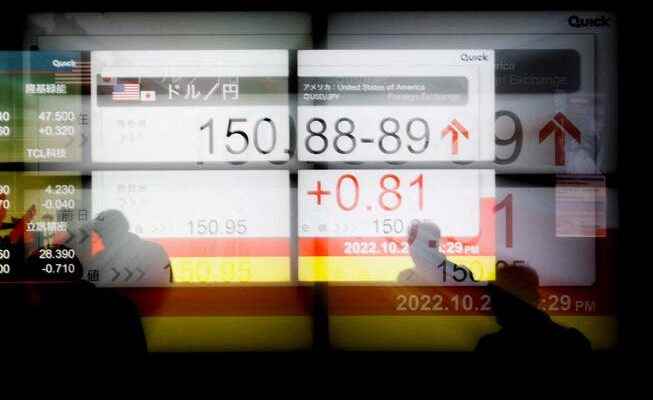The yen has not been as weak as it is now in over 30 years. In the meantime, even the first analysts expect that the central bank could raise interest rates for the first time in years.
The Japanese currency is recovering, but only slowly.
Japan’s finance ministry intervened to support the yen for the second time in four weeks. The yen reacted promptly, rising against the dollar from nearly 152 yen on Friday night to 144 yen on Saturday morning, before falling again later in the day.
This was the government’s reaction to the rapid fall of the yen against the dollar. On Thursday, the dollar-yen exchange rate fell below the 150 yen mark for the first time in 32 years. Finance Minister Shunichi Suzuki then warned: “We cannot tolerate excessive and rapid movements through speculative trading in the foreign exchange market.” Even the previous expert consensus on the Japanese central bank’s special path shows cracks.
So far, most Japanese central bank observers have agreed that the Bank of Japan will buck the global trend towards higher interest rates until the end of its boss Haruhiko Kuroda’s term of office in early April 2023. But Tohru Sasaki, the foreign exchange strategist at JP Morgan Chase in Tokyo, is now warning of an imminent price correction shortly before the next interest rate decision on October 28th.
“The Bank of Japan is likely to take a small step early next year,” Sasaki said in a report late last week. He believes that raising the upper limit of the 10-year government bond rate corridor (JGBs) to 0.5 percent from the current 0.25 percent is the most likely action.
Why the Bank of Japan is going its own way
As small as the step would be, the surprise would be great. Because Kuroda had repeatedly emphasized that the economic situation in Japan justifies ongoing low interest rates. And many economists have followed him. Although prices are also rising in Japan, they have recently risen by three percent, significantly less than in most other countries.
In addition, higher commodity and import prices are responsible for this, rather than high domestic demand and growth, as in the United States. Both are weak in Japan. Higher interest rates would therefore curb Japan’s growth. Sayuri Shirai, a former board member and now an economics professor at Keio University, therefore believes that a rate hike is not urgent for Japan’s central bankers. “If inflation goes up to four or five percent, maybe they’ll think about it.”
The problem: The yen became a victim of this policy when the US Federal Reserve began to raise interest rates at an unprecedented rate in the fight against inflation. Because the difference between interest rates in Japan and the United States is considered a factor in the development of exchange rates.
Joker Yen: The weaker the currency, the higher the inflationary pressures
In this case, the widening interest rate spread between the United States and most other countries in the world means that the dollar has risen massively globally, including against the euro. Japan will be hit particularly hard, however, as Japan’s central bankers, unlike their peers, have so far not hiked interest rates at all.
Prior to the intervention, the yen had therefore fallen almost a third against the dollar and a tenth against the euro since the beginning of the year. This increases price pressure as Japan has to pay more and more for its imports. But inflationary pressure is also growing beyond that, says JP Morgan’s expert Sasaki.
The trade union umbrella organization Rengo has already announced that it will demand a five percent salary increase in the upcoming round of collective bargaining. That would be the highest demand since the mid-1990s. The opening of the border for tourists could give an additional boost to the economy. At the same time, companies are becoming more willing to pass on higher producer prices to end customers.
The high national debt limits Japan’s interest rate leeway
However, most observers and investors believe that the yen’s fall will continue for the time being despite the intervention in the currency market. Forecasts of a dollar-yen exchange rate of 160 yen were already circulating in the middle of the year. Yujiro Goto, foreign exchange strategist at the Japanese investment bank Nomura, who had already expected government intervention, has now downgraded his forecast for the end of November from 150 to 155 yen. And that may not be the end for him: “In line with market expectations for further rate hikes by the Fed, the dollar should continue to rise in the short term.”
Even an interest rate hike by the Bank of Japan is unlikely to change much. Doubling the interest rate cap on 10-year JGBs would only push the yen higher by 3 to 4 percent, Sasaki estimates. And nobody in Japan likes to imagine a series of interest rate hikes because of the high national debt. According to the rating agency Fitch, it is around 250 percent of economic output.
So far, Japan has been able to afford this because the central bank has already bought up 50 percent of the national debt as part of its ultra-loose monetary policy. Nevertheless, higher interest rates would increase debt service. The Finance Ministry estimated earlier this year that a one percentage point increase would increase the government’s annual interest payments by one-sixth to about €200 billion.
